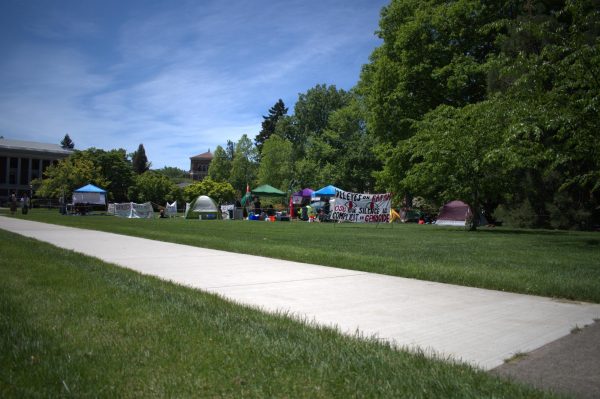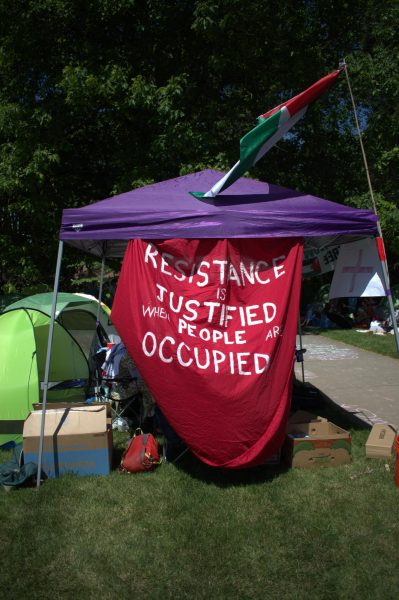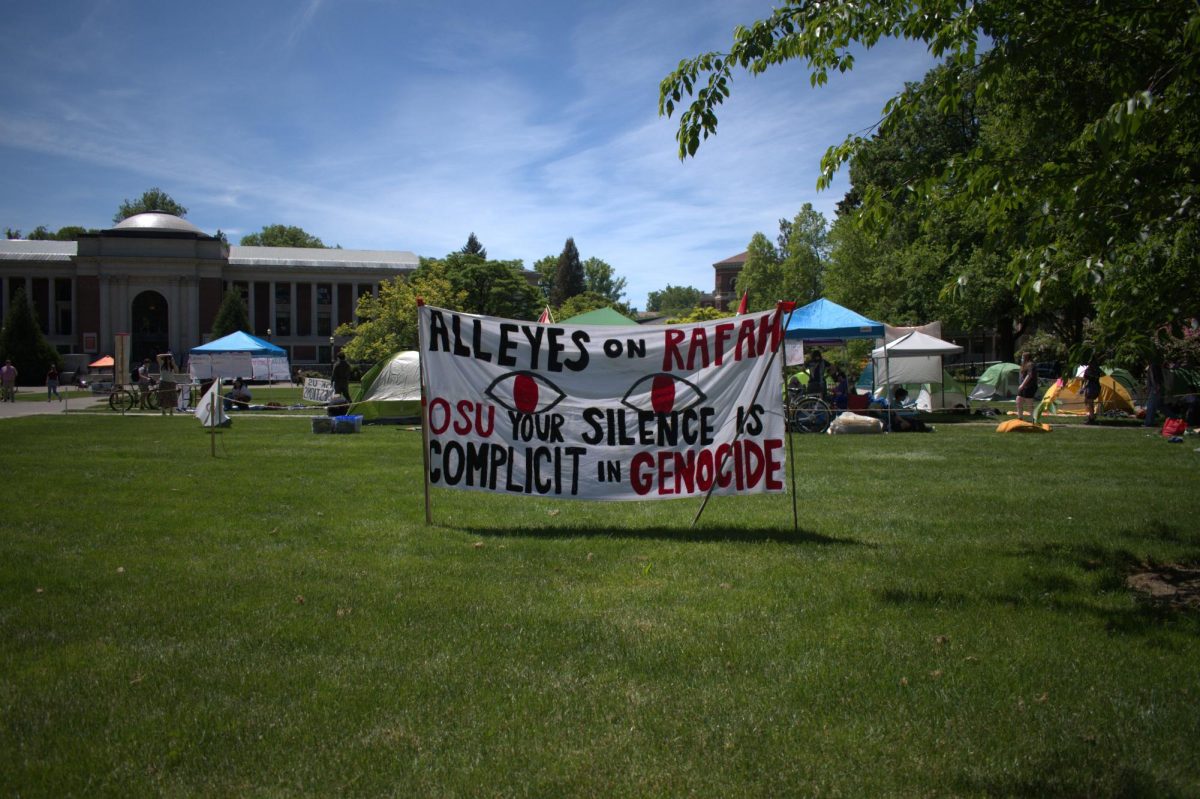Editor’s note: This story has been updated to include a statement from University Relations and Marketing. URM disputes OSU-PSC’s allegation that additional Student Code of Conduct violations were issued after the encampment disbanded.
University officials said they are working toward implementing some agreed-upon actions after previous communications with the Oregon State University Palestine Solidarity Coalition encampment in spring term.
Rob Odom, vice president for University Relations and Marketing, said that the university is “working diligently to develop the structures and committees necessary to implement the actions shared with the OSU community in May.”
“Those who expressed interest in participating in implementing the actions have and will continue to be updated on the university’s progress,” Odom said. “OSU will circulate another request for participation later this summer to ensure community members who are interested have the opportunity to share their desire for involvement.”
According to Odom, regular updates will be posted on the university’s website titled “How OSU is taking action to respond to the crisis in Gaza, Israel and the region”.
Among the actions OSU agreed to fulfill was the creation of a Task Force on Responsible Investing and a Task Force on Responsible Procurement, according to the university statement released May 21.
OSU agreed to have the Task Force on Responsible Investing make recommendations for policy revisions to the OSU Board of Trustees. They agreed to have the Task Force on Responsible Procurement align procurement with institutional values and make recommendations to the OSU president.
OSU previously stated that they would establish these task forces and launch in fall 2024, but that they will “not reserve spots for any single interested group.”
When administrators were asked by the Barometer directly if students can be task force members, how task force members will be selected, who will select members and when members will be selected, Odom stated that “students are encouraged to share their interest and will be considered for membership,” but “the rest hasn’t yet been announced.”
University Relations and Marketing was unclear when specifically the task forces would be implemented and how members would be chosen.
On May 15, on Nakba Day, the OSU-PSC assembled an encampment in the Memorial Union Quad to show solidarity for the Palestinian people, prompting a back-and-forth with OSU officials in May and June.

When the encampment began, OSU-PSC compiled a list of demands for OSU that was posted to the Instagram page of Students United for Palestinian Equal Rights at OSU.
These demands included a boycott of business contracts tied to the genocide of the Palestinian people, academic amnesty for protestors and calling for OSU to issue a “public statement condemning Israel’s ongoing genocidal aggression on Palestine and a call for a permanent ceasefire.”
On May 21, OSU issued a “final response” to the OSU-PSC, setting a disbandment deadline for the encampment.
The response outlined various plans “based on communications with the OSU-PSC” providing actions that “advance the OSU-PSC’s goals and the university’s mission and values.”
On May 28, eight members of the encampment were sent exclusion notices by the OSU Police Department, resulting in a ban of these students and staff from the Memorial Union, MU Quad and Student Experience Center Plaza for one year, according to SUPER’s instagram.
The encampment relocated from the MU Quad to the Valley Library Quad on May 29.
On June 7, Odom sent a side-by-side comparison of OSU-PSC’s demands and OSU’s actions titled “How OSU has responded to encampment participant demands.”
OSU committed to OSU-PSC’s demands regarding protection of free expression and academic freedom rights of all OSU community members and to enforcing university policies prohibiting discriminatory conduct. OSU agreed to OSU-PSC’s demand to provide information about its direct investments.

OSU stated their plan “largely aligns as written” with OSU-PSC’s demands to create a library guide contextualizing the history of displacement and violence in the region.
However, OSU-PSC’s demand stated the guide will allow for and encourage community members to “engage topics of imperialism, colonialism and oppression critically.” OSU’s plan omits these specificities.
OSU declined to establish a Task Force on Ethical Academic Partnership on the grounds that “academic boycotts infringe on academic freedom.”
OSU responded to OSU-PSC’s demand for full financial support for 10 Palestinian scholars by saying they are “dedicating grant aid to eligible students whose academic course of study has been disrupted by violence and conflict.” Over the next three years, students impacted by violence in Gaza and Israel will be given substantial consideration for support.
OSU-PSC demanded that OSU “will not sanction any OSU student or university employee for their participation in the overnight encampment.” OSU, as per Odom’s side-by-side, stated that “upon disassembly of the encampment, and pending no future violations of university policies … no additional referrals will be made of students or employees.”
The encampment disbanded on June 12. On June 27, SUPER posted on Instagram that OSU violated its June 7 plan, referring to Odom’s side-by-side comparison, by issuing additional Student Code of Conduct violations to a member of the encampment. OSU-PSC did not specify the violations.
The university denies this claim.
“No additional referrals related to participating in the encampment were made to the Office of Student Conduct and Community Standards or Employee and Labor Relations after the encampment disbanded on June 12,” Odom said in an email.


















































































![Newspaper clipping from February 25, 1970 in the Daily Barometer showing an article written by Bob Allen, past Barometer Editor. This article was written to spotlight both the student body’s lack of participation with student government at the time in conjunction with their class representatives response. [It’s important to note ASOSU was not structured identically to today’s standards, likely having a president on behalf of each class work together as one entity as opposed to one president representing all classes.]](https://dailybaro.orangemedianetwork.com/wp-content/uploads/2025/03/Screenshot-2025-03-12-1.00.42-PM-e1741811160853.png)























